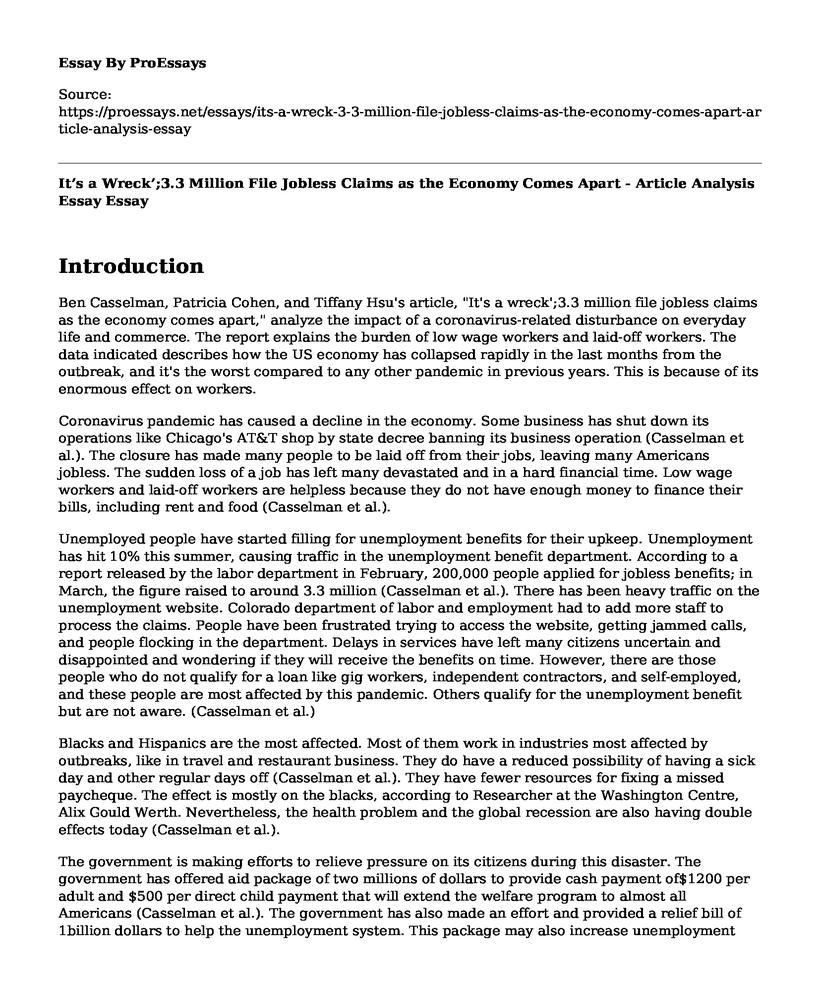Introduction
Ben Casselman, Patricia Cohen, and Tiffany Hsu's article, "It's a wreck';3.3 million file jobless claims as the economy comes apart," analyze the impact of a coronavirus-related disturbance on everyday life and commerce. The report explains the burden of low wage workers and laid-off workers. The data indicated describes how the US economy has collapsed rapidly in the last months from the outbreak, and it's the worst compared to any other pandemic in previous years. This is because of its enormous effect on workers.
Coronavirus pandemic has caused a decline in the economy. Some business has shut down its operations like Chicago's AT&T shop by state decree banning its business operation (Casselman et al.). The closure has made many people to be laid off from their jobs, leaving many Americans jobless. The sudden loss of a job has left many devastated and in a hard financial time. Low wage workers and laid-off workers are helpless because they do not have enough money to finance their bills, including rent and food (Casselman et al.).
Unemployed people have started filling for unemployment benefits for their upkeep. Unemployment has hit 10% this summer, causing traffic in the unemployment benefit department. According to a report released by the labor department in February, 200,000 people applied for jobless benefits; in March, the figure raised to around 3.3 million (Casselman et al.). There has been heavy traffic on the unemployment website. Colorado department of labor and employment had to add more staff to process the claims. People have been frustrated trying to access the website, getting jammed calls, and people flocking in the department. Delays in services have left many citizens uncertain and disappointed and wondering if they will receive the benefits on time. However, there are those people who do not qualify for a loan like gig workers, independent contractors, and self-employed, and these people are most affected by this pandemic. Others qualify for the unemployment benefit but are not aware. (Casselman et al.)
Blacks and Hispanics are the most affected. Most of them work in industries most affected by outbreaks, like in travel and restaurant business. They do have a reduced possibility of having a sick day and other regular days off (Casselman et al.). They have fewer resources for fixing a missed paycheque. The effect is mostly on the blacks, according to Researcher at the Washington Centre, Alix Gould Werth. Nevertheless, the health problem and the global recession are also having double effects today (Casselman et al.).
The government is making efforts to relieve pressure on its citizens during this disaster. The government has offered aid package of two millions of dollars to provide cash payment of$1200 per adult and $500 per direct child payment that will extend the welfare program to almost all Americans (Casselman et al.). The government has also made an effort and provided a relief bill of 1billion dollars to help the unemployment system. This package may also increase unemployment benefits and how often employees who have been laid off seek compensation. However, the aid package will not expand on the food assistance program. The government is also looking for other avenues to help the unemployed who do not qualify for an unemployment claim (Casselman et al.).
In my opinion, the economic losses are far higher in the road of illness, so forecasting the direction has been nearly tricky because the various facets of the epidemic are unquantifiable. I find that economic losses are recent and unexplored, contributing to a global recession with negative inflation. In my opinion, the biggest issue is whether economies will be able to rebound to their pre-shock production and growth levels and whether there will be any legacy economic impact of the coronavirus crisis. I find that unemployment reports across the US have risen statistically unparalleled across recent weeks, triggering the financial crisis. I believe predicting will not help. I find that Singapore has resurfaced, which may happen in the US, but the only experience can say early, in which proactive interventions will pay off.
Work Cited
Casselman, Ben et al. "' It'S A Wreck': 3.3 Million File Unemployment Claims As Economy Comes Apart". Nytimes.Com, 2020, https://www.nytimes.com/2020/03/26/business/economy/coronavirus-unemployment-claims.html.
Cite this page
It's a Wreck';3.3 Million File Jobless Claims as the Economy Comes Apart - Article Analysis Essay. (2023, May 04). Retrieved from https://proessays.net/essays/its-a-wreck-3-3-million-file-jobless-claims-as-the-economy-comes-apart-article-analysis-essay
If you are the original author of this essay and no longer wish to have it published on the ProEssays website, please click below to request its removal:
- Paper Example on Evidence-Based Practice in Clinical Decision Making
- Breaking the Surface by Greg Louganis Essay Example
- Pathophysiology of Hemodynamics - Essay Sample
- Gaucher Disease: Rare Genetic Disorder Discovered in 1882 - Research Paper
- Research Paper on School Meals in Early Childhood: Planting the Seeds of Sustainability
- Essay Example on US vs Canada: Comparing Healthcare Systems
- Understanding Varicose Vein Problems - Free Report Example







